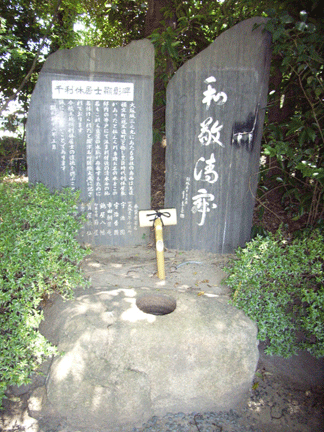SEN NO RIKYU
(by the editorial staff of arianuova.org)

A film to celebrate the tea master’s fourth centenary. Looks at his last years leading up to his ritual suicide, in the context of the historical events of the time.
Sen no Rikyu (1522-1591) was born in the merchant city of Sakai. By the time he reached 58, he was serving as tea master to Oda Nobunaga, the leading daimyo in Japan. After Nobunaga’s assassination, he became the tea master for Toyotomi Hideyoshi, Nobunaga’s successor and military dictator of Japan. When Hideyoshi hosted a tea at the Imperial Palace in 1585, Rikyu received the Buddhist rank of koji from the Emperor Ogimachi. This was an honorary title for a lay person who had lived a pious faithful Buddhist, and from that time he was known as Sen no Rikyu Koji. This established his preminence among the leading Japanese tea practitioners.
According to Rikyu there are four fundamental qualities that should be exemplified in the tea ceremony: harmony, respect, purity, tranquillity. These are the same qualities that practitioners of the tea ceremony endeavour to integrate into their daily lives.
Rikyu taught many things about the tea ceremony. Two of his better known sayings are:
«Though many people drink tea, if you do not know the Way of Tea, tea will drink you up.» And «The Way of Tea is naught but this: first you boil water, then you make the tea and drink it.»
Although Rikyu’s tea ceremony is closely associated with Zen Buddhism, three of Rikyu’s seven desciples were devote Christians.
Rikyu also wrote poetry, and practiced ikebana.
Rikyu’s sense of esthetic influenced design as well. He popularized the use of smaller stone lanterns as garden ornamentations. He also designed new utensils for serving tea. Rather than basing them on the formal Chinese designs that were previously used, Rikyu’s designs were wonders of simplicity and typically contained asymmetrical irregularities which gave them a natural quality.
Rikyu’s relationship with Hideyoshi was a complex one and eventually caused his death. Rikyu was more than Hideyoshi’s tea master; he was often an advisor on other matters as well. Yet Rikyu maintained his independence and the relationship was occasionally stormy. When Rikyu refused Hideyoshi’s request to take Rikyu’s daughter as a concubine, the relationship never recovered. Eventually, Hideyoshi ordered Rikyu to commit ritual suicide. While the reasons are not known, tradition holds that Hideyoshi was infuriated when he entered the gate of Daitoku-ji temple (whose construction he had funded) and saw that he was walking under a statue of Rikyu. After Rikyu's death, Hideyoshi was said to have repented, regretting the loss of such a great person.
Just before his death, Rikyu called together his family and disciples. He then composed his death poem.
I raise the sword.
This sword of mine;
Long in my possession.
The time is come at last.
Skyward I throw it up!
According to Okakura Kakuzo in The Book of Tea, his last act was to hold an exquisite tea ceremony. After serving all his guests, he presented each piece of the tea-equipage for their inspection, along with an exquisite kakemono, which Okakura described as «a wonderful writing by an ancient monk dealing with the evanescence of all things.» Rikyu presented each of his guests with a piece of the equipment as a souvenir, with the exception of the bowl, which he shattered, uttering «Never again shall this cup, polluted by the lips of misfortune, be used by man.» As the guests departed, one remained to serve as witness to Rikyu’s death. Rikyu’s last words, which he wrote down as a death poem, were in verse, addressed to the dagger with which he took his own life:
Welcome to thee,
O sword of eternity!
Through Buddha
And through Daruma alike
Thou hast cleft thy way.
